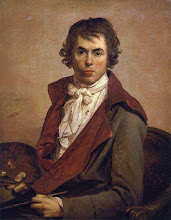Do media create distance between participant (viewer, reader, etc.) and event? That seems to be the big question of the week, and like all big questions, this one falls perilously short of appropriately addressing the issue. The relationship between media, audience, and event is an incredibly complex dynamic of power, space, and trust (those are not mutually exclusive.).
For those who don’t really have the patience or the desire to read Foucault (not many do), there’s a great little essay by David Foster Wallace (back at you Pop Culture Critic) called E Unibus Pluram (the title's source), which does a decent job of explicating the relationship between media, audience, and event.
For our purposes, though, let’s assume that media is an event itself. Watching TV, going to a film, sitting through a play, those are all events. And that media event imposes itself on our conscious immediately acting as a lens through which we perceive another event. Now, I chose the word lens carefully, because although lens create distance, the sometimes offer clarity. I think that model accurately captures media.
So any absolutist argument, in my opinion, off the bat assumes an agenda. Reading “Easy Citizenship: Television’s Curious Legacy” was like reading a 1940s article bashing the TV as evil. Ad homonym attacks aside, one of Hart’s thesis: “not everything that is good for us is easy,” suffers from a lack of sophistication and a subtle adherence to an agenda – that media is bad.
The Reeher piece does a much better job at representing the complexity that a discussion of this subject must undertake. He views media as neither inherently good nor bad, it is an event, and with all events it carries the connotations and effects it accumulates over time.
The internet, for example, is controlled by the clicking of the individual. Its very structure forces active participation (perhaps unlike television) in the event of surfing. So, activism online is already occurring. To use a Hart word, its structure creates “inertia.”
The Obama campaign has certainly exploited this inertia and turned it into a cash and voter collecting system of unparalleled precedence. They have treated media as a tool, specifically the internet, which can not only access many, many people, but it can also turn them into active users. This is just a reflection. I’m thinking more about this problem for a later, lengthier post.
Migrated to Tumblr
15 years ago


1 comment:
Matt I think you brilliantly express your point and I happen to agree with much of what you are saying. Additionally, the Foster article is a great starting point for looking into your question.
I would only like to point out to you that you say:
"Now, I chose the word lens carefully, because although lens create distance, the sometimes offer clarity. I think that model accurately captures media."
I do agree with your analysis of what a lens actually does, but there is one more possibility, a lens can also hurt your vision (if it is the wrong or damaged lens). We seem to see this dynamic, in my opinion, very often in politics. Politicians try to manipulate the facts and distort our "lenses" by convincing us that we need to look at specific things and have missed others (by pointing out certain statistics or pointing out flaws in the other campaign's statements).
I'm not saying that we shouldn't use our lenses, or that politicians shouldn't try to manipulate what we see through them, I want to point out that WE need to make sure that we check to make sure our lenses are being used to help us see the truth and make it clearer for us.
Post a Comment